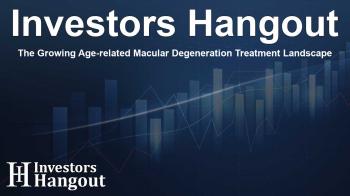The Growing Age-related Macular Degeneration Treatment Landscape

Understanding Age-related Macular Degeneration
Age-related macular degeneration (AMD) is a serious eye condition that significantly contributes to vision loss in older adults, affecting millions around the world. As life expectancy increases, the prevalence of AMD is rising, resulting in a substantial burden on healthcare systems. This condition most commonly manifests in two forms: dry and wet AMD. While both types lead to central vision impairment, they present distinct challenges and treatment approaches.
Trends in AMD Treatment Development
The market for AMD treatments is expected to evolve significantly due to increased investment in research and the introduction of innovative therapies. Recent findings signal a promising future for existing and novel treatments that aim to slow disease progression. Studies highlight that, although no cure for AMD exists, early detection and therapeutic interventions can dramatically affect patient outcomes.
In particular, the management of wet AMD typically relies on anti-VEGF injections, which work to inhibit the growth of abnormal blood vessels in the eye. Dry AMD, on the other hand, is treated through a combination of lifestyle changes and nutritional supplementation, emphasizing the importance of diet and regular eye exams.
Market Insights for Dry AMD
Recent reports reveal critical statistics for dry AMD, showcasing approximately 21 million cases in the United States alone. This figure is projected to escalate, presenting significant market opportunities for new therapies. Companies are actively exploring treatment options that combine existing therapeutic agents with innovative delivery methods.
Two recently FDA-approved drugs, SYFOVRE and IZERVAY, aim to slow the progression of advanced dry AMD but do not restore lost vision. Both medications face ongoing safety scrutiny amid their competitive market dynamic.
Emerging Treatments for Dry AMD
A variety of companies are engaged in the development of next-generation therapies for dry AMD. Notable players like Alkeus Pharmaceuticals and Allegro Ophthalmics are exploring novel compounds to help mitigate the effects of dry AMD. According to market insights, the strategic positioning of these companies will likely influence future growth trajectories in this segment.
Wet AMD Market Overview
Conversely, wet AMD represents a critical area for therapeutic development due to its aggressive nature and the high percentage of vision loss it causes. Despite accounting for only 10% of AMD cases, wet AMD is responsible for roughly 90% of the severe visual impairment stemming from the condition.
As of the latest estimates, over 1.3 million cases have been reported in the U.S. for wet AMD, with projections indicating substantial growth in the coming years. Advancements in anti-VEGF therapies have greatly transformed the treatment landscape, leading to improved patient outcomes.
Anticipated Innovations in Wet AMD Treatment
Several pharmaceutical companies are at the forefront of addressing unmet needs in wet AMD treatment. Research initiatives are underway to enhance existing therapies and identify novel approaches to overcome resistance in non-responsive patients. This innovative drive creates a vibrant atmosphere for both established and emerging companies in this therapeutic area.
Collaborations and Market Growth Forecast
Ongoing collaborations and investments within the biotechnology sector are anticipated to propel market growth. The combined efforts of healthcare providers, pharmaceutical companies, and research institutions will play a vital role in shaping the future of AMD management.
Market analyses indicate that by 2034, significant advancements in treatment options will also coincide with an increase in patient population due to aging demographics. This opportunity compels stakeholders to focus on comprehensive strategies that may include combination therapies, innovative delivery technologies, and broader accessibility to treatment options.
Frequently Asked Questions
What is age-related macular degeneration?
Age-related macular degeneration (AMD) is a progressive eye disease that affects the macula, leading to vision loss in older adults.
How is wet AMD treated?
Wet AMD is typically treated using anti-VEGF injections aimed at preventing vision loss caused by abnormal blood vessel growth.
What are the key players in the AMD treatment market?
Significant players include Alkeus Pharmaceuticals, Allegro Ophthalmics, and other biotechnology firms focusing on innovative therapies.
Why is early detection of AMD important?
Early detection of AMD can lead to timely intervention, potentially slowing disease progression and preserving vision.
What trends are shaping the AMD treatment landscape?
Emerging therapies, technological advancements, and an increasing understanding of AMD play critical roles in shaping future treatment options.
About The Author
Contact Dominic Sanders privately here. Or send an email with ATTN: Dominic Sanders as the subject to contact@investorshangout.com.
About Investors Hangout
Investors Hangout is a leading online stock forum for financial discussion and learning, offering a wide range of free tools and resources. It draws in traders of all levels, who exchange market knowledge, investigate trading tactics, and keep an eye on industry developments in real time. Featuring financial articles, stock message boards, quotes, charts, company profiles, and live news updates. Through cooperative learning and a wealth of informational resources, it helps users from novices creating their first portfolios to experts honing their techniques. Join Investors Hangout today: https://investorshangout.com/
The content of this article is based on factual, publicly available information and does not represent legal, financial, or investment advice. Investors Hangout does not offer financial advice, and the author is not a licensed financial advisor. Consult a qualified advisor before making any financial or investment decisions based on this article. This article should not be considered advice to purchase, sell, or hold any securities or other investments. If any of the material provided here is inaccurate, please contact us for corrections.

